calsfoundation@cals.org
Lockesburg (Sevier County)
| Latitude and Longitude | 33°58’02″N 094°10’07″W |
| Elevation: | 433 feet |
| Area: | 3.48 square miles (2020 Census) |
| Population: | 594 (2020 Census) |
| Incorporation Date: | November 7, 1878 |
Historical Population as per the U.S. Census:
|
1810 |
1820 |
1830 |
1840 |
1850 |
1860 |
1870 |
1880 |
1890 |
1900 |
|
– |
– |
– |
– |
– |
– |
– |
256 |
451 |
550 |
|
1910 |
1920 |
1930 |
1940 |
1950 |
1960 |
1970 |
1980 |
1990 |
2000 |
|
748 |
794 |
747 |
764 |
714 |
511 |
620 |
616 |
608 |
711 |
|
2010 |
2020 |
|
|
|
|
|
|
|
|
|
739 |
594 |
|
|
|
|
|
|
|
|
Lockesburg, located near the center of Sevier County at the crossroads of State Highways 24 and 71, was once a center of local business and farm trade and served as the county seat for approximately thirty-six years. The city lost much of its importance when it was bypassed by the railroad in the late nineteenth century and also when it lost its status as the county seat in the early twentieth century. Still, the county’s oldest incorporated city, surrounded by productive farm land, has supported an average population of 600 citizens throughout its existence.
The land upon which Lockesburg was built was first occupied by Native Americans. This fact is evidenced by a number of mounds found in the area and numerous artifacts collected over the years. The Locke family, who arrived by 1835 (about seven years after the creation of Sevier County), were the area’s first white settlers, hailing from Alabama. Over the years, members of the family became prominent landowners and important area leaders.
When Sevier County was created in 1828, the centrally located settlement of Paraclifta was designated as the county seat of government. In 1867, when an area of Sevier County was carved away to become part of newly created Little River County, Paraclifta was no longer centrally located. Discussions began about the possibility of relocating the county seat. The Locke brothers—James, William, and Matthew—offered 120 acres of land, and Royal Appleton offered sixty acres for the site of a new county seat. On January 18, 1869, a petition to relocate the seat of government to Lockesburg was accepted by the county court. In October 1869, a county board of commissioners contracted with A. M. Hawkins and Brothers to construct a two-story brick courthouse and jail at a cost of $12,400. The contract ultimately cost twice that amount. The first session of the county court was held in the new building in March 1871. Poor construction resulted in a new jail being built in 1884. It burned in 1887, and a third structure was built.
Though the city was not incorporated until November 7, 1878, it saw significant growth in the early 1870s. William T. Locke, as the first elected mayor, led that early development. Many people moved from the near-abandoned Paraclifta, with some of its buildings dismantled and moved to Lockesburg. A post office was established on May 3, 1870, with Matthew W. Locke as postmaster. Judge Williamson is believed to have built the city’s first house and William Wallace the first business. James Francis Hill opened the first hotel in 1872. The Masons were also established that year. Both Methodist and Cumberland Presbyterian congregations were established by 1872. They were followed by the Baptists in 1892.
The town has been home to a number of newspapers, the first being The Alliance, founded by J. L. Wadley and the Reverend M. E. Lee about 1881. Other papers were the Lockesburg Tribune, Lockesburg Enterprise, The Chronicle, The Sevier County Democrat, Southwestern Gazette, and the Lockesburg Review.
The first school, known as Tobe’s School, was established in a log building just north of the town in about 1871. M. W. Locke gave land for the establishment of the county’s first high school, called the Hesperian High School around 1893. Along with a respected curriculum, the school supported football and boys’ and girls’ basketball teams known as the Blue Darters. In 1901, a School Improvement Association was created, and a local Parent Teachers Association. That same year, Lockesburg was one of two county high schools in 1925.
The 1890 census recorded that the city had a population of 451. Among the growing business district were three general stores, a millinery, three blacksmiths, a shoe shop, a drugstore, three doctors, and a popular hotel operated by John and Katherine Locke. By the end of the decade, it was reported that the “small village” had “large and well appointed stores in a town of this size.” One source recorded that there were as many as twenty businesses.
The event that would ultimately lead to the decline of the city took place near the turn of the twentieth century. About 1897, when a route for the Kansas City, Pittsburg and Gulf Railroad (now the Kansas City Southern) was being sought through the area, a number of local citizens were unwilling to sell a right-of-way to the railway company. As a result, the tracks were put down about fifteen miles to the northwest in what would become De Queen (Sevier County). Many families began to move there.
While the outlook for the city seemed less than bright, there was a resurgence in about 1900 when a short-line railroad, the DeQueen and Eastern Railroad, was built near the city by the Dierks company for the purpose of exploiting the abundant area timber. For a short time, the railroad provided passenger service. The city began a steady population growth that continued until the 1960s, when the timber industry began a decline.
A major blow to the city’s importance occurred in 1905 when the county quorum court voted to build a new courthouse. Almost immediately, De Queen residents began a campaign to relocate the seat of government to their city by offering $10,000 for the new courthouse. Later that year, a special election was held, and Lockesburg suffered the same fate as Paraclifta had years before (by 150 votes).
Even after the loss of the county government, the population of the city has remained steady. By the 1920s, most made a living by farming or working at local sawmills.
In 1972, the fossilized bones of the hind foot of an unclassified dinosaur were discovered in a shallow pit on the land of local resident Joe B. Friday. A professor at the University of Arkansas (UA) in Fayetteville (Washington County) gave the bones the informal name Arkansaurus Fridayi. To date, they are the only dinosaur bones uncovered in Arkansas.
Effiegene Locke Wingo, the second Arkansas woman to be elected to the U.S. House of Representatives, was born in Lockesburg on April 13, 1883. Cecil Ernest Johnson, a chief justice of the Supreme Court of Arkansas, was also born in Lockesburg.
With assistance from the Public Works Administration (PWA), a water tower was constructed in 1936. The Lockesburg High School Gymnasium was constructed in the early 1950s and, like the water tower, is listed on the National Register of Historic Places; it is owned by the Cossatot Community College of the University of Arkansas.
Until 2020, the population of the city had not dropped below 600 since the 1960s. Lockesburg avoided community-devastating school consolidation until 2010.
In the twenty-first century, the city of 594 citizens (2020 census) is home to more than thirty businesses, including two banks. Many visitors are attracted to the area by whitewater rafting on the Cossatot River at the nearby Cossatot River State Park-Natural Area. The 30,000-acre Pond Creek National Wildlife Refuge is located approximately fourteen miles south of Lockesburg. Home to many species of migratory birds, the refuge is available for many outdoor activities, including fishing, hunting, and wildlife observation.
For additional information:
Biographical and Historical Memoirs of Southern Arkansas. Chicago: Goodspeed Publishing Company, 1890.
Lockesburg: The First One Hundred, 1878–1978.Delight, AR: Alexander Printing Company, Inc., 1978.
McCommas, Betty. The History of Sevier County and Her People. Dallas, TX: Taylor Publishing Company, 1980.
Yarborough, Anna Nash. “Legends of Lockesburg.” Arkansas Democrat, September 25, 1960, p. 7.
Mike Polston
CALS Encyclopedia of Arkansas
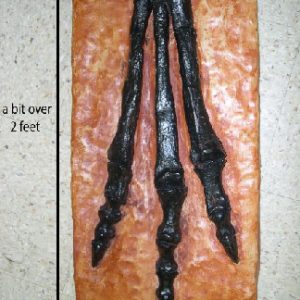 Arkansaurus fridayi Foot Bone Cast
Arkansaurus fridayi Foot Bone Cast 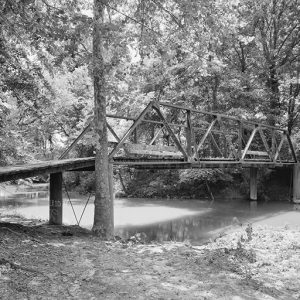 Little Cossatot River Bridge
Little Cossatot River Bridge 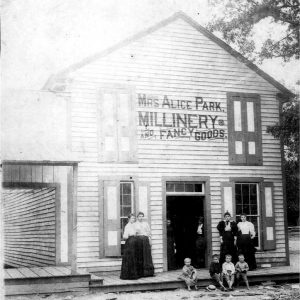 Lockesburg Millinery Store
Lockesburg Millinery Store 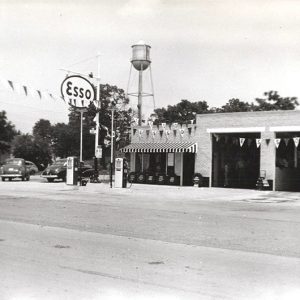 Lockesburg Street Scene
Lockesburg Street Scene 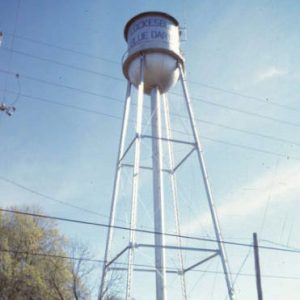 Lockesburg Water Tower
Lockesburg Water Tower 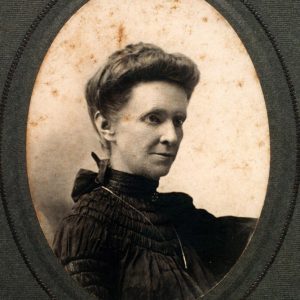 Martha Alice Steele Park
Martha Alice Steele Park 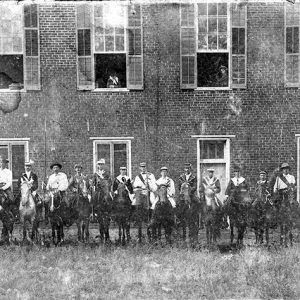 Sevier County Courthouse
Sevier County Courthouse 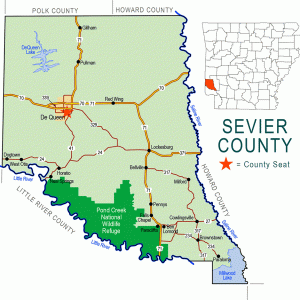 Sevier County Map
Sevier County Map  Effiegene Wingo
Effiegene Wingo 



My grandmother was Phoebe Allene Steele. I have some historical papers from her.